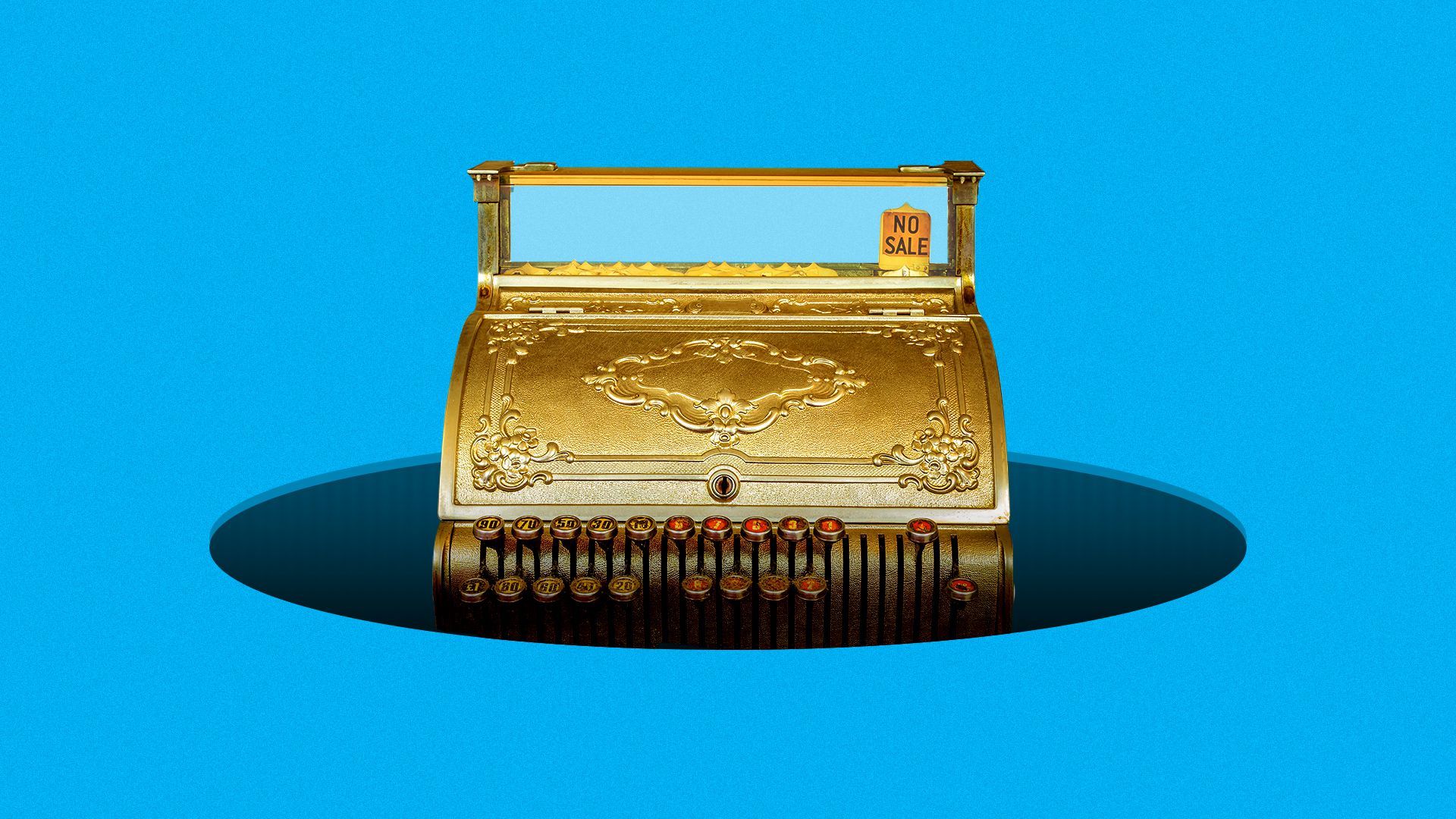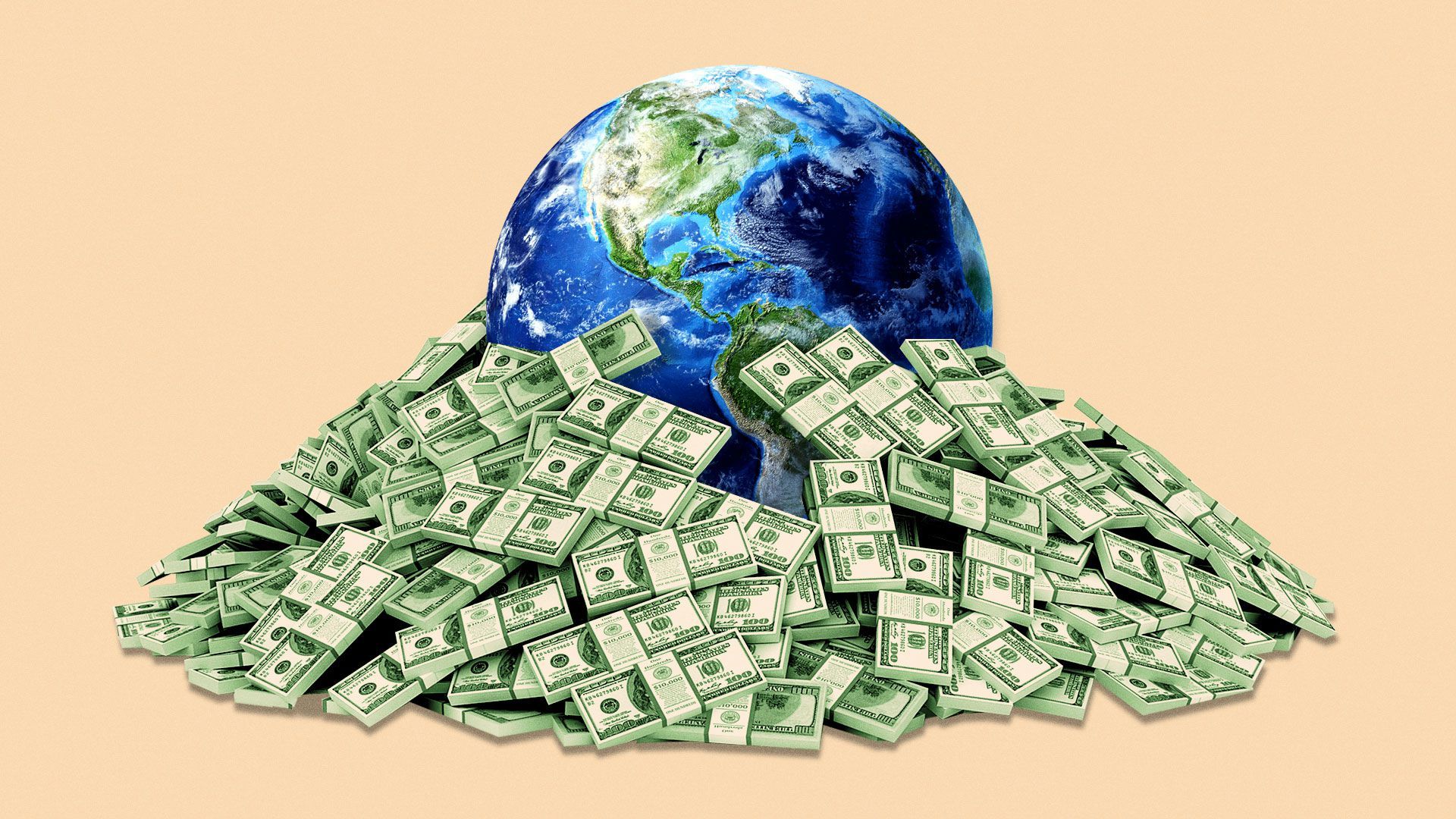| | | | | | | Presented By Public.com | | | | Axios Markets | | By Dion Rabouin ·Feb 19, 2021 | | Happy Friday! Was this email forwarded to you? Sign up here. (Today's Smart Brevity count: 1,346 words, 5 minutes.) 🕰 Trivia: The High Priestess of Soul, Dr. Nina Simone (as she asked to be called), studied at the prestigious Juilliard School of Music but did not graduate. She did, however, go on to earn honorary degrees from these three colleges. | | | | | | 1 big thing: Stuck in a rut |  | | | Illustration: Aïda Amer/Axios | | | | Optimism is rising as coronavirus cases recede, vaccinations increase and economists price in a strong recovery for the U.S. economy through 2021, but beneath blowout retail sales reports and rising GDP expectations many Americans are still struggling to stay afloat. Driving the news: A report released today surveying more than 11,000 small business owners and thousands more employees and consumers by Facebook finds that things had only improved slightly in December for most since its last survey in the throes of the coronavirus pandemic in April. - Small business closure rates remained high, with 25% still shut in December, down from 31% in April.
- 52% reported that they had lower sales in the last 30 days compared to last year, a decrease of just 4 percentage points from April.
- Of those with lower sales, 44% reported that their sales were lower by at least half in December from the month before, down from 53% in April.
Why it matters: Small businesses "are widely considered the backbone of the U.S. economy," the analysts note in the survey, and the slow recovery in their return to normal is likely a major reason for the depressed U.S. labor market and malaise in consumer confidence. Watch this space: The January U.S. retail sales report showed a historic 7.4% year-over-year increase in sales, but that was largely concentrated in online sales, sporting goods and cars and furniture, with nonstore retailers seeing a 22.1% gain from January 2020. - Conversely, restaurants and bars and clothing stores both saw double-digit annual declines in sales.
- Electronics stores, gasoline stations, electronics and department stores reported negative readings as well.
Be smart: Large stores, especially those with a strong e-commerce presence, have benefited from the changing nature of shopping during the pandemic, but Walmart CEO Doug McMillon says what he's seen at his stores recently makes clear that Americans are struggling. - "We can see in our customer behavior that some customers — as they received this most recent stimulus — are spending it more on basics, more on private brands, smaller pack sizes, things like that as opposed to some of the stimulus dollars that came out earlier last year that were spent more like tax rebate checks, where people were buying televisions and things to entertain themselves at home," he told CNBC.
- "There's a bit of a mix shift now and we think it reflects the fact that customers out there do need some help."
The bottom line: Of businesses closed in December, the most cited reasons for closure were government restrictions (33%), financial reasons (30%) and reductions in demand (26%). - This contrasts to April, when 62% of businesses were closed due to government and health authority orders.
|     | | | | | | Bonus chart: CEO confidence hits 17-year high |  Data: The Conference Board; Chart: Andrew Witherspoon/Axios In contrast to the dwindling confidence of most U.S. consumers, CEOs have not felt as good about the economic outlook as they do now in nearly 20 years. By the numbers: The Conference Board's latest quarterly reading of CEO confidence rose to its highest since the first quarter of 2004. - Overall, 82% of CEOs expect economic conditions to improve over the next six months, up from 63% last quarter, the Conference Board reported.
- The percentage of CEOs expecting conditions to worsen was cut in half, dropping to 7% from 15%.
- Similarly, 78% of CEOs anticipate short-term prospects in their own industries to improve, up from 65% in September.
Don't sleep: The nine-point jump in CEO confidence followed a 19-point surge in September from the previous survey, rising to 73 for Q1. - CEO confidence declined to as low as 34 in March 2020. A reading below 50 means more respondents said they were less confident than respondents who said they were more confident during the survey period.
|     | | | | | | 2. Catch up quick | | The U.S. vaccine supply is expected to double quickly enough that there will be enough doses to vaccinate all Americans before the end of July. (Bloomberg) Treasury Secretary Janet Yellen said the SEC will prepare a report on trading practices amid the recent stock market volatility surrounding "meme stocks." (Reuters) The global chip shortage has closed U.S. auto factories, slowed consumer electronics shipments and is posing an early challenge to the Biden administration's promise to revive the struggling U.S. manufacturing sector. (N.Y. Times) |     | | | | | | A message from Public.com | | This is your new favorite (investing) app | | |  | | | | Public.com is one part investing app, one part community where you can share ideas and get smarter alongside friends and experts. Transfer your existing portfolio to Public and they'll cover the fees. Sign up and start with $10 in free stock.* *See Public.com/disclosures/. | | | | | | 3. Brainard details more of the Fed's climate change plans |  | | | Illustration: Eniola Odetunde/Axios | | | | Axios Generate author Ben Geman writes: A key member of the Federal Reserve's board said climate change is "already imposing substantial economic costs" as she laid out new information about the Fed's approach to the topic. Why it matters: Lael Brainard's remarks signal the Fed's deepening involvement in the nexus between global warming and the financial system. - The comments also matter because she's seen as a frontrunner to be the Fed's next chair if President Biden replaces Jerome Powell, a Trump appointee, when his term expires early next year.
Driving the news: Brainard, speaking to a climate conference Thursday, said a few things worth noting... 1) She moved toward backing compulsory disclosure of climate risks by financial institutions. - "Ultimately, moving toward standardized, reliable, and mandatory disclosures could provide better access to the data required to appropriately manage risks," Brainard said at the Institute of International Finance event.
2) Brainard said the Fed should subject financial institutions to "scenario analysis" to determine risks from physical effects of climate change and the transition to a low-carbon economy. - Of note: While environmentalists have called for "climate stress tests" of banks akin to tests of their ability to withstand economic shocks, Brainard didn't go that far.
- She said it's not a "regulatory exercise" like stress tests but instead an "exploratory" effort to gauge "business model resilience to a range of long-run scenarios."
- A number of Republicans have pushed back against the idea of climate stress tests.
3) Brainard also offered a little more info about the Fed's recently formed "Supervision Climate Committee." She said it's already interacting with a "diverse group" of financial institutions and industry groups to see how thinking about climate risks and opportunities and preparing for a low-carbon economy. |     | | | | | | 4. Investors see a tough recovery for U.S. economy |  Data: Boston Consulting Group Investor Pulse Check; Chart: Andrew Witherspoon/Axios Fewer investors are expecting the U.S. to experience a double-dip recession, but many remain cautious on the economic outlook, according to a new survey from Boston Consulting Group of 150 asset managers overseeing more than $5 trillion. What's happening: Investors surveyed by BCG said they were more bullish on both the economy and the stock market than during its last survey in December, but have long-term misgivings about the state of the economy. - Overall respondents said they anticipate the severe economic impact of the crisis will continue for two quarters longer than previously expected, through the fourth quarter of 2021.
Pay attention: While 63% of investors said they are more bullish on the economy than one month ago, 54% of investors expect a U- or W-shaped economic recovery. - An additional 23% expect an L-shaped recovery — one in which the economy suffers causes structural, long-term damage and never completely recovers.
Between the lines: Investors' most popular response was that an additional $1.3 trillion of stimulus — $600 billion less than the U.S. administration's current proposal to Congress — is required to support the economy through this crisis. |     | | | | | | 5. After GameStop, there are fewer short bets, but more money | | Short positions in U.S. equities have declined significantly since "meme stocks" like GameStop exploded higher earlier this year, S&P Global Market Intelligence data show. By the numbers: At the end of January, the percentage of outstanding shares of S&P 500 companies held by short sellers averaged 3.1%, down from 4.1% a year ago. - Short interest in the most shorted of the S&P 500's 11 sectors in 2020, consumer discretionary, fell to 4.7% at the end of January, down from 5.4% in the middle of the month and from 6.7% at the end of January 2020.
What they're saying: "I think a lot of hedge funds are stepping back until the retail euphoria calms down," Pauline Bell, an equity analyst at CFRA Research, told S&P Global Market Intelligence. - "Hedge funds are on the lookout. They don't want to get burned."
Yes, but: The number of short positions investors are taking is in decline, but the amount of money investors are putting in short interest positions appears to be increasing, according to an analysis by Ihor Dusaniwsky, managing director at S3 Partners. - Short interest in the Russell 3000 index as a percentage of the float fell from 7.2% as of Dec. 29, 2020, to 5.8% as of Feb. 16, 2021, but the amount of money in short interest positions rose by about 4.1% over the same timeframe, Dusaniwsky's analysis found.
How it works: "If an observer was just looking at the number of chips you are betting they would surmise that you were reducing your bets, but an observer looking at the dollar value of your bets would understand that the size of your bet was increasing," Dusaniwsky said. |     | | | | | | A message from Public.com | | The app that makes the stock market social | | |  | | | | Public.com is one part investing app, one part community where you can share ideas and get smarter alongside friends and experts. Transfer your existing portfolio to Public and they'll cover the fees. Sign up and start with $10 in free stock.* *See Public.com/disclosures/. | | | | Thanks for reading! Trivia: The High Priestess of Soul, Dr. Nina Simone (as she asked to be called), studied at the prestigious Juilliard School of Music but did not graduate. She did, however, go on to earn honorary degrees from these three colleges. Answer: Curtis Institute of Music, University of Massachusetts Amherst and Malcolm X College. | | | | Axios thanks our partners for supporting our newsletters.
Sponsorship has no influence on editorial content. Axios, 3100 Clarendon Blvd, Suite 1300, Arlington VA 22201 | | | You received this email because you signed up for newsletters from Axios.
Change your preferences or unsubscribe here. | | | Was this email forwarded to you?
Sign up now to get Axios in your inbox. | | | | Follow Axios on social media:    | | | | | |








No comments:
Post a Comment